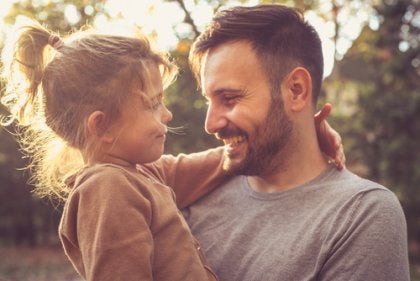A Better Way To Educate and Raise Children

Although there are many different educational philosophies and methods, parents seem more lost than ever regarding child-rearing. Why is that? After 28 years as a psychologist, I believe that overprotectiveness is a barrier to putting all that available information into practice. However, there’s a better way to educate and raise children. That’s what we’ll discuss today.
Parents and educators have become helicopters, hovering over their children all day long. This doesn’t allow healthy development. Children need to discover the world and experiment. If they’re continuously under the supervision of an adult, they won’t be able to.
In addition, parents and educators pass on their own fears to the children in their care, whether they realize it or not. Your children, after all, are a relatively accurate reflection of who you are.

Education today
It’s true that life today is more complex in so many ways. Although the basics are still the same, technology has added many more facets to what it means to be a parent or a child.
It seems to me that the way we raise children doesn’t make sense. On one hand, you don’t want to make a mistake and you want everything to be perfect. On the other hand, you want your children to be perfect as well. However, this is counterproductive and often results in exactly the opposite.
Although it’s obviously important to raise your children the best way you can, you’ll definitely make mistakes. Your children will make mistakes. Sometimes you win, sometimes you lose. But failure often brings important lessons as well.
Maybe your overprotectiveness is related to your desire to control everything so that things go the way you want them to. Life doesn’t work that way, unfortunately. At the end of the day, many things are out of your control.
A better way to educate
The fundamental and basic elements for a healthy upbringing are:
- Recognizing and valuing appropriate behavior. Constantly criticizing children doesn’t help at all. Being angry all the time is a completely ineffective way to get your message across.
- Be empathetic and put yourself in your children’s shoes. Since you were a child once, remembering what that was like can help you be more understanding.
- Do as you say, say as you do. Be consistent. If you don’t really intend to do something, it’s better not to mention it.
- Listen carefully to what your children have to say and how they feel. This makes communication much easier.
- Express how you feel. Most people think it’s inappropriate to express negative feelings in front of children. However, if you do it correctly, it can be a great lesson on emotional management.
- Take care of yourself. If you focus entirely on your children and forget about self-care, you’ll burn out quickly and have nothing left for your children. As the saying goes, you can’t pour from an empty cup. If you try, you’ll send your kids the message that taking care of yourself isn’t important.
Be a good example
As a parent (or an educator) you pass on your values and beliefs in your everyday interactions with your children. If you’re looking for a better way to educate, pay attention to your own behavior.
Although you won’t be the only person that influences their future behavior, the way you educate and raise them sets them up for the future.
Actions speak louder than words, especially when dealing with children. That’s why it’s so important to make sure that what you say coincides with what you do.
You can’t pour from an empty cup
As a psychologist, I can confirm that “the apple doesn’t fall far from the tree”. Consequently, it’s very important to make sure that you’re setting a good example for your children and taking care of yourself.
If you don’t, burnout happens pretty fast. Your concern for your children turns into a heavy and unhealthy burden.
As we mentioned above, if you don’t have any time or energy left for yourself, you won’t have anything to give. The worst part is that you’ll be showing your children that self-care isn’t important. If you don’t practice it, why should they?

Pass your values down
Your behavior has to reflect the values you want to pass down to your children. If it doesn’t, your words lose their meaning. That’s why it’s so important to be motivated and to always seek out a better way to educate. Be aware that you’re responsible for your children’s future well-being.
- You’re the primary foundation of your children’s healthy development.
- You’re their main example and role model.
- Their development and learning start with you.
Being a good parent isn’t easy. Take care of yourself so you can feel good and have plenty of energy to help your children live their best lives.
Although there are many different educational philosophies and methods, parents seem more lost than ever regarding child-rearing. Why is that? After 28 years as a psychologist, I believe that overprotectiveness is a barrier to putting all that available information into practice. However, there’s a better way to educate and raise children. That’s what we’ll discuss today.
Parents and educators have become helicopters, hovering over their children all day long. This doesn’t allow healthy development. Children need to discover the world and experiment. If they’re continuously under the supervision of an adult, they won’t be able to.
In addition, parents and educators pass on their own fears to the children in their care, whether they realize it or not. Your children, after all, are a relatively accurate reflection of who you are.

Education today
It’s true that life today is more complex in so many ways. Although the basics are still the same, technology has added many more facets to what it means to be a parent or a child.
It seems to me that the way we raise children doesn’t make sense. On one hand, you don’t want to make a mistake and you want everything to be perfect. On the other hand, you want your children to be perfect as well. However, this is counterproductive and often results in exactly the opposite.
Although it’s obviously important to raise your children the best way you can, you’ll definitely make mistakes. Your children will make mistakes. Sometimes you win, sometimes you lose. But failure often brings important lessons as well.
Maybe your overprotectiveness is related to your desire to control everything so that things go the way you want them to. Life doesn’t work that way, unfortunately. At the end of the day, many things are out of your control.
A better way to educate
The fundamental and basic elements for a healthy upbringing are:
- Recognizing and valuing appropriate behavior. Constantly criticizing children doesn’t help at all. Being angry all the time is a completely ineffective way to get your message across.
- Be empathetic and put yourself in your children’s shoes. Since you were a child once, remembering what that was like can help you be more understanding.
- Do as you say, say as you do. Be consistent. If you don’t really intend to do something, it’s better not to mention it.
- Listen carefully to what your children have to say and how they feel. This makes communication much easier.
- Express how you feel. Most people think it’s inappropriate to express negative feelings in front of children. However, if you do it correctly, it can be a great lesson on emotional management.
- Take care of yourself. If you focus entirely on your children and forget about self-care, you’ll burn out quickly and have nothing left for your children. As the saying goes, you can’t pour from an empty cup. If you try, you’ll send your kids the message that taking care of yourself isn’t important.
Be a good example
As a parent (or an educator) you pass on your values and beliefs in your everyday interactions with your children. If you’re looking for a better way to educate, pay attention to your own behavior.
Although you won’t be the only person that influences their future behavior, the way you educate and raise them sets them up for the future.
Actions speak louder than words, especially when dealing with children. That’s why it’s so important to make sure that what you say coincides with what you do.
You can’t pour from an empty cup
As a psychologist, I can confirm that “the apple doesn’t fall far from the tree”. Consequently, it’s very important to make sure that you’re setting a good example for your children and taking care of yourself.
If you don’t, burnout happens pretty fast. Your concern for your children turns into a heavy and unhealthy burden.
As we mentioned above, if you don’t have any time or energy left for yourself, you won’t have anything to give. The worst part is that you’ll be showing your children that self-care isn’t important. If you don’t practice it, why should they?

Pass your values down
Your behavior has to reflect the values you want to pass down to your children. If it doesn’t, your words lose their meaning. That’s why it’s so important to be motivated and to always seek out a better way to educate. Be aware that you’re responsible for your children’s future well-being.
- You’re the primary foundation of your children’s healthy development.
- You’re their main example and role model.
- Their development and learning start with you.
Being a good parent isn’t easy. Take care of yourself so you can feel good and have plenty of energy to help your children live their best lives.
This text is provided for informational purposes only and does not replace consultation with a professional. If in doubt, consult your specialist.







